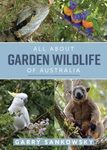By: Zoe Sadokierski(Author), Andrew Burrell(Author), Dieter Hochuli(Author), John Martin(Author)
272 pages, monochrome illustrations
![A Guide to the Creatures in Your Neighbourhood A Guide to the Creatures in Your Neighbourhood]()
Click to have a closer look
About this book
Contents
Customer reviews
Biography
Related titles
About this book
In cities and suburbs all over Australia, a staggering array of animals and plants make their homes among us. If we pay attention, each encounter with a bird, a flower or a bee is an invitation into a fascinating world of growth, decay, communication and sensation – and it's all going on right under our noses.
Did you know crows can identify humans by their faces? Or that ibises can 'see' with the tips of their bills? Let the team from the Urban Field Naturalist Project amaze you with weird and wonderful facts about cockatoos, magpies, spiders, possums and other animals just outside your doorstep. Then get inspired to cultivate a deeper connection with tips for observing, sketching, photographing and making field notes – or simply sitting still to observe and listen.
Whether for an afternoon of exploring or a walk to the letterbox, A Guide to the Creatures in Your Neighbourhood is your ticket to slow down and get curious about urban nature. No matter where you live, you'll have a front row seat!
Contents
Introduction: An invitation into our fascinating world
Part 1: The world of the urban field naturalist
Part 2: Guides for appreciating urban creatures
Guide to crows
Guide to snails
Guide to ibis
Guide to cockatoos
Guide to staring at flowers
Guide to hoverflies
Guide to lesser-known pollinators
Guide to bats
Guide to common birds
Guide to deadly Australian animals
Guide to mammals
Guide to lizards
Part 3: Nature journaling and storytelling activities
Part 4: Stories from the field
Customer Reviews
Biography
The Urban Field Naturalist Project is a collaboration between experts in environmental and digital humanities, the life sciences and design dedicated to helping people notice and appreciate wildlife in urban environments. It is led by Dr Zoe Sadokierski and Dr Andrew Burrell (School of Design, University of Technology, Sydney), Professor Dieter Hochuli (School of Life and Environmental Sciences, The University of Sydney), Dr John Martin (Institute of Science & Learning, Taronga Conservation Society Australia) and Associate Professor Thom van Dooren (School of Philosophical and Historical Inquiry, The University of Sydney and Oslo School of Environmental Humanities, University of Oslo).
By: Zoe Sadokierski(Author), Andrew Burrell(Author), Dieter Hochuli(Author), John Martin(Author)
272 pages, monochrome illustrations



































